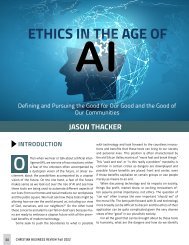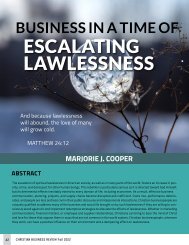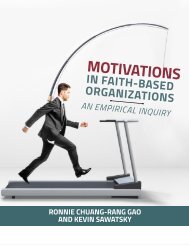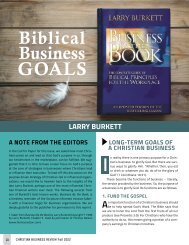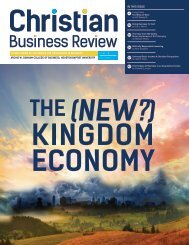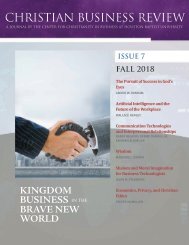Christian Business Review 2022: Pressing On Toward God's Goal
You also want an ePaper? Increase the reach of your titles
YUMPU automatically turns print PDFs into web optimized ePapers that Google loves.
MOTIVATIONS IN FAITH-BASED ORGANIZATIONS<br />
CBR PEER-REVIEWED ARTICLES<br />
goal attainment process. Instrumentality refers to belief<br />
that meeting performance expectations will be rewarded by<br />
financial incentives, recognition, promotion, or sense of accomplishment.<br />
This belief is determined by the level of trust<br />
in those who decide on rewards, perceived control of how<br />
the reward decision is made, and understanding of the policies<br />
that connect performance and reward. Valence refers to<br />
the value put on the rewards received, or satisfaction with<br />
the rewards, which is related to factors such as needs, goals,<br />
value systems, and sources of motivation. The product term<br />
of expectancy, instrumentality, and valence is called “motivational<br />
force.” When selecting among multiple behavioral<br />
options, people will select the one with the highest amount<br />
of motivational force. 3<br />
We posit that in FBOs, personal faith is positively related<br />
to each of expectancy, instrumentality, and valence. First,<br />
for expectancy, employees high in personal faith should<br />
have higher levels of meaningfulness and sense of purpose<br />
in their work, which will motivate more involvement in their<br />
work. Personal faith can also lead to greater cooperation and<br />
mutual support among coworkers. These factors will bring<br />
both higher levels of perceived self-efficacy and lower levels<br />
of goal difficulties, leading to higher expectancy. Second,<br />
instrumentality is determined by the level of trust in managers<br />
who make reward decisions. Employees and managers<br />
working in FBOs often have the same religious background,<br />
which should create greater trust because employees are<br />
likely to categorize their managers as “in-group”, rather than<br />
“out-group” and thus trust them more, according to social<br />
identity theory. 21 Managers, following personal religious beliefs<br />
(e.g., honesty), are more likely to keep reward promises<br />
by honoring reward policies, which will lead to higher instrumentality.<br />
This effect should be stronger among employees<br />
high in personal faith because they are more likely to trust<br />
their managers more as mentioned above. Third, for valence<br />
in FBOs, employees high in personal faith are more likely to<br />
value rewards because they believe the rewards ultimately<br />
come from God (Psalm 16:2; James 1:17).<br />
We further posit that in FBOs, motivation is positively<br />
related to job satisfaction. Herzberg's two-factor theory of<br />
motivation distinguishes between motivators and hygiene<br />
factors. Motivators, such as achievement, recognition for<br />
achievement, the work itself, responsibility, and growth or<br />
advancement, lead to job satisfaction. By contrast, hygiene<br />
factors, such as job security, work conditions, and salary, do<br />
not lead to job satisfaction, but their absence can lead to dissatisfaction.<br />
As discussed, more motivated employees are<br />
likely to believe that they are able to achieve tasks and will<br />
be rewarded and recognized, which, according to two-factor<br />
theory, will lead to higher job satisfaction. 4 Previous research<br />
confirms a positive relationship between intrinsic motivation<br />
(e.g., achievement, recognition) and job satisfaction in general<br />
work settings. 22 Thus:<br />
Hypothesis 2<br />
In FBOs, motivation mediates the relationship between<br />
personal faith and job satisfaction. That is,<br />
personal faith is positively related to motivation, and<br />
motivation is positively related to job satisfaction.<br />
PERCEIVED FIT BETWEEN<br />
PERSONAL FAITH AND<br />
ORGANIZATIONAL FAITH<br />
Within a particular religion there is substantial diversity<br />
in beliefs and practices. This diversity makes it possible<br />
for employees in an FBO to have different levels of perceived<br />
fit between personal faith and organizational faith. We posit<br />
that in FBOs, this perceived fit between personal and organizational<br />
faith is positively related to job satisfaction for two<br />
reasons. First, how workers perceive the spirituality of their<br />
organization can affect their work attitudes, beliefs, satisfaction,<br />
and capacity to overcome work challenges. 23 When<br />
employees perceive a good fit between personal and organizational<br />
faith they will identify with the organization, which<br />
will make them feel more involved with the organization’s<br />
mission 24 and their own job. 12 These higher levels of identification<br />
and involvement should lead to higher levels of job<br />
satisfaction. Previous research confirmed the link between<br />
organizational identification and job satisfaction. 25 Second,<br />
employees with a high level of perceived fit are more likely<br />
to experience a spiritual calling to their jobs when there is<br />
consistency between their own faith and that of their organization.<br />
Neubert and Halbesleben confirmed the positive link<br />
between spiritual calling and job satisfaction. 15 Thus:<br />
Hypothesis 3<br />
In FBOs, the perceived fit between personal faith<br />
and organizational faith is positively related to job<br />
satisfaction.<br />
We anticipated that motivation would mediate the re-<br />
CHRISTIAN BUSINESS REVIEW Fall <strong>2022</strong> 252




